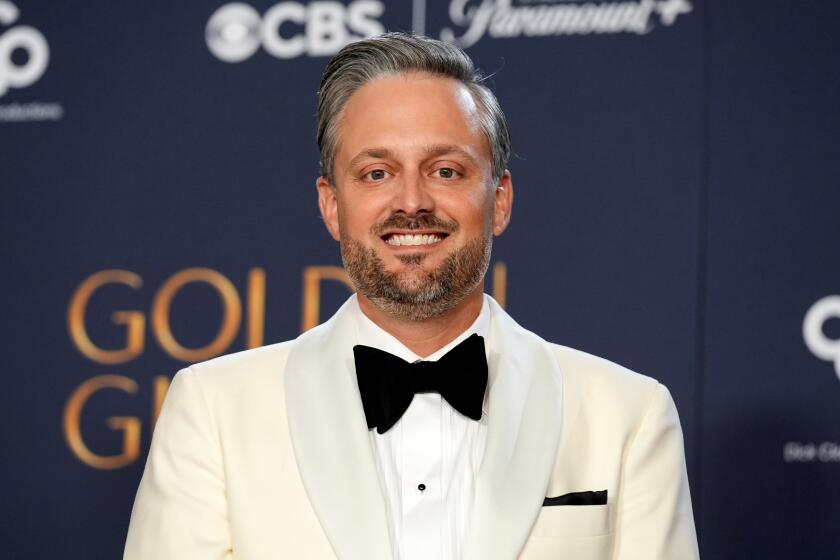Out of the Picture
- Share via
My proposed new Emmy category: Most Racially Insensitive Remark by a Female Funnywoman on a National Talk Show.
The one and only nominee: Joan Rivers for her performance last week on “Politically Incorrect with Bill Maher.”
At one point, Rivers unexpectedly unleashed a bellyful of invective against protesters at the recent Emmy awards ceremony. She was bilious about their bellyaching over the lack of minorities on network television shows.
“Oh, watch ‘Jerry Springer,’ ” Rivers hissed, her face distorted with a disturbing anger. “Watch ‘Cops.’ I am so sick of this.”
Call me too touchy, but with that contemptuous remark I fear she dismissed all colored folk as criminals and trailer trash. That’s not fair. We often get on “The Price Is Right” as materialistic contestants, panting over the prospect of winning free products by guessing the cost. Rivers didn’t give us credit for that.
But such is the liberty of being politically incorrect. It affords us the delicious license to slander entire races of people on national TV without that annoying guilty feeling. Free at last from our Sixties hang-ups that forced us to take seriously the problems of racism and discrimination.
Oh, grow up!
I must confess I haven’t paid much attention to the call for a “brownout” of network shows during the two weeks from Sept. 12-25. The boycott comes in the wake of a Times story detailing the whitening of network television. There’s not a single minority in a lead role in the 26 new prime-time shows set to debut this fall on the four major networks, and nearly all the cast regulars will be white.
The problem: Diversity doesn’t pay. TV mavens are bent on delivering the audience advertisers want most: young whites.
We’re still in mid-brownout, but you wouldn’t know it by talking to the average Latino. Take me, for example. Just Sunday night I watched part of “The Practice,” that preposterous drama about overwrought attorneys. (Come to think of it, the show does feature two African American characters.)
I didn’t get a chance to find out whodunit because I was pleasantly interrupted by a call from my friend, the lovely Elisabeth Lopez, a smart and caring Latina who earned a degree in communications from UCLA.
In her college days, the absence of minorities in the media was a topic of discussion among Latinos on campus. But Elisabeth, a phone company sales rep from Cerritos, was unaware of the current brownout. So was our mutual friend Rosie Caballero, an accountant from Orange, the bright and irrepressible daughter of Mexican immigrants.
They both instinctively understand the power of entertainment over politics. Minorities in droves are happy to watch TV shows and movies, whether dark-skinned actors appear on the screen or not.
Those cagey entertainment execs are no dummies, either. They shoot for a white audience and pull minorities as a bonus. That’s assimilation the fun way, via entertainment.
On Friday, in fact, Elisabeth, Rosie and I merrily went to see “The Sixth Sense,” a gripping ghost movie starring Bruce Willis. We loved it, not as ethnic consumers but as human beings. Discrimination was the furthest thing from our minds during the scary and emotional film.
I always have the habit, though, of searching the credits at the end for Latino names. I read them like a roster of our progress in getting a foothold in the movie business.
And there it was among the acting credits: the name Carlos Lopez. You didn’t actually see him in the movie, but he did have a speaking part at a crucial moment. Lopez was the off-screen voice of a ghost who said a few words in Spanish.
Well, I guess we have to start somewhere.
Jerry Velasco, a leader of the brownout, says the campaign has been effective because it has drawn attention to the distressing issue. Now it’s up to the public to keep pressuring for shows that more accurately reflect the makeup of America. We all need to wake up, he says.
That includes insiders like Rivers, who often speaks of her ethnic Jewish roots. “She should know better because she’s one of us, another minority that has suffered,” Velasco told me Sunday after his return from Washington, D.C., where he lobbied Latino lawmakers for assistance.
During his stay, Velasco and other minority media advocates visited the Holocaust Memorial Museum. The lesson he learned there about combating hate and discrimination: You have to talk about it.
That’s precisely what protesters are trying to do with the whitewashed TV season. But the problem is, says Velasco, president of Nosotros, “every time we talk about it, they criticize us.”
Agustin Gurza’s column appears Tuesday and Saturday. Readers can reach Gurza at (714) 966-7712 or agustin.gurza@latimes.com
More to Read
The complete guide to home viewing
Get Screen Gab for everything about the TV shows and streaming movies everyone’s talking about.
You may occasionally receive promotional content from the Los Angeles Times.






